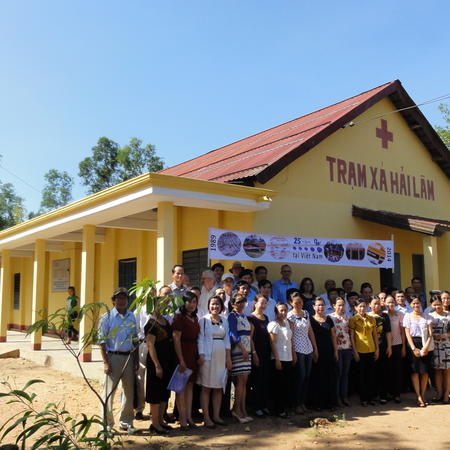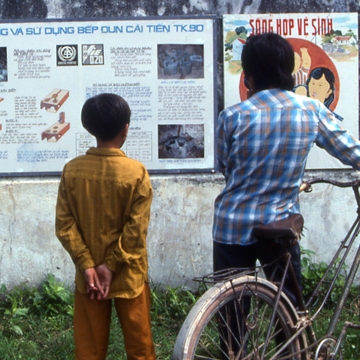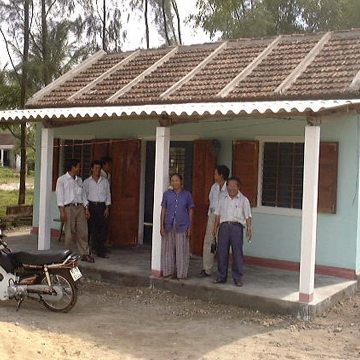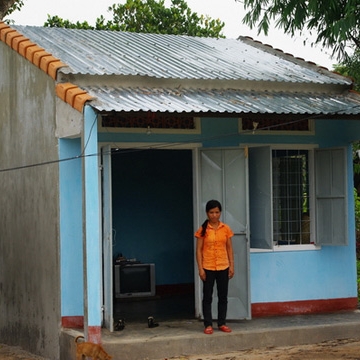Climate Change: A Cancun Christmas wish list
CANCUN, 9 December 2010 (IRIN) - Reaching a convergence of views on at least some of the pressing issues being discussed at the UN climate change talks in Cancun, Mexico, before they end on 10 December, is at the top of the wish list of many delegates. Moving towards implementation often appears to be a star too far.
IRIN spoke to four leading climate change negotiating officials from developing countries about their Cancun Christmas wish list: Tosi Mpanu-Mpanu from the Democratic Republic of Congo, the Africa group’s chief negotiator; Hasan Mahmud, the Bangladesh Minister for Environment and Forests; Dessima Williams, chair of the Alliance of Small Island States (AOSIS); and Mama Konate, the main negotiator from Mali.
In the corridors of Moon Palace, the venue where the talks are being held, thousands of delegates walk purposefully from one gathering to another. But the negotiations have been moving at a slower pace, with “extreme options” on many issues – “we need to come to a compromise” position to move forward, said Mpanu-Mpanu.
He would like to see a compromise that could deliver a new climate fund to help developing countries adapt to the impact of extreme natural climatic events, provide technology and build capacity to cope, and grow with fewer greenhouse gas emissions.
The Intergovernmental Panel on Climate Change (IPCC) has identified Africa as one of the regions most vulnerable to the impact of climate change, not only because of the climate variability it faces but also for its “low adaptive capacity” - the continent is home to most of the world’s Least Developed Countries.
“A Christmas wish out of … the [climate change] talks involves a very emotional issue for us … But we have to put our emotions aside and negotiate,” Mpanu-Mpanu told IRIN.
African countries cannot afford to send large delegations, so they have pooled their technical skills and resources and divided the negotiating tracks – adaptation, mitigation, finance, capacity building and technology transfer – among themselves.
“The division of labour has worked very well for us. Despite our limited resources we have worked very efficiently - we are 53 countries and now speaking with one voice,” Mpanu-Mpanu said.
He expects the Africa group to deliver everyone’s Christmas wish. “We are working on a [negotiating] text which will try to bring everyone together, as I think every other group [at the talks] is as well,” he said.
“We have two tools on our side - international law, in the form of the Kyoto Protocol [of the UN Framework Convention on Climate Change] and science – we plan to use these,” Mpanu-Mpanu said.
Hasan Mahmud, a former academic, now Bangladesh’s Minister for Environment and Forests, is less optimistic. “If we don’t come up with some progress here in Cancun, after the failure of Copenhagen, people will dismiss this as another UN picnic.”
Mahmud, along with his counterpart from Australia, has been asked to work with the negotiators to resolve issues around finance, capacity building and technology transfer. He, too, would like to achieve consensus.
The debate on the Finance Track of the negotiations has jammed over the establishment of a new climate change fund. “All countries agree we need a fund, but there are countries who are opposed to the establishment of one in Cancun, while developing countries would like to see something concrete come out of here.”
Progress in the talks on capacity building and technology transfer was also tied to the availability of funds, but one of the sticking points in the transfer of technology – for instance, to produce renewable energy – was intellectual property rights, Mahmud said.
“Many developed countries call for strong patent laws in developing nations to ease technology transfer,” wrote Achala Chandani and Linda Siegele, researchers at the UK-based International Institute for Environment and Development in a brief on the Cancun meeting.
“[However,] some developing countries say that strictly enforced patent rights can lead to high licence costs and obstruct the use and adaptation of technologies for local conditions.”
Mahmud said many countries were suggesting that the debate on intellectual property rights be deferred.
The fiery Dessima Williams, chair of the Alliance of Small Island States (AOSIS) would love to see an international mechanism set up to provide financial compensation for the loss and damage caused by a rising sea level, more intense and frequent cyclones, and other slow-onset impacts of climate change.
AOSIS proposed the mechanism in 2008. “We must see this happen here [Cancun], otherwise we will not be able to survive,” she said.
The cost of extreme natural events “can cripple poor nations — in 2008 cyclone Nargis killed more than 138,000 people in Myanmar and caused an estimated US$4 billion in damages [about 30 percent of the country’s gross domestic product],” wrote Chandani and Siegele.
“Developed countries are uncomfortable with terms like ‘compensation’ when describing the ‘Loss and Damage’ mechanism, because it indicates a legal obligation to take an action,” the international NGO, World Wide Fund for Nature (WWF) noted in a statement in Cancun.
WWF said the mechanism should also cover climate change induced displacement, migration and relocation of vulnerable populations.
Many negotiators agreed with Mama Konate, the lead negotiator from Mali, that the twin-track process – of reducing greenhouse gas emissions, and providing support to developing countries for mitigation and adaptation – should continue.
“We cannot support calls from some countries to do away with the twin-track process,” said Konate, who also chairs the Subsidiary Body for Scientific and Technological Advice of the UNFCCC.
There is a split between some developed and all developing countries over whether support for adaptation should also be accounted for as emissions are. Developing countries want financial support to be measurable.
Konate said the process to set up a new climate fund should happen in Cancun, and not be left until a later date.
“There is goodwill,” he said optimistically. ”There is much less aggression than compared to Copenhagen.”











